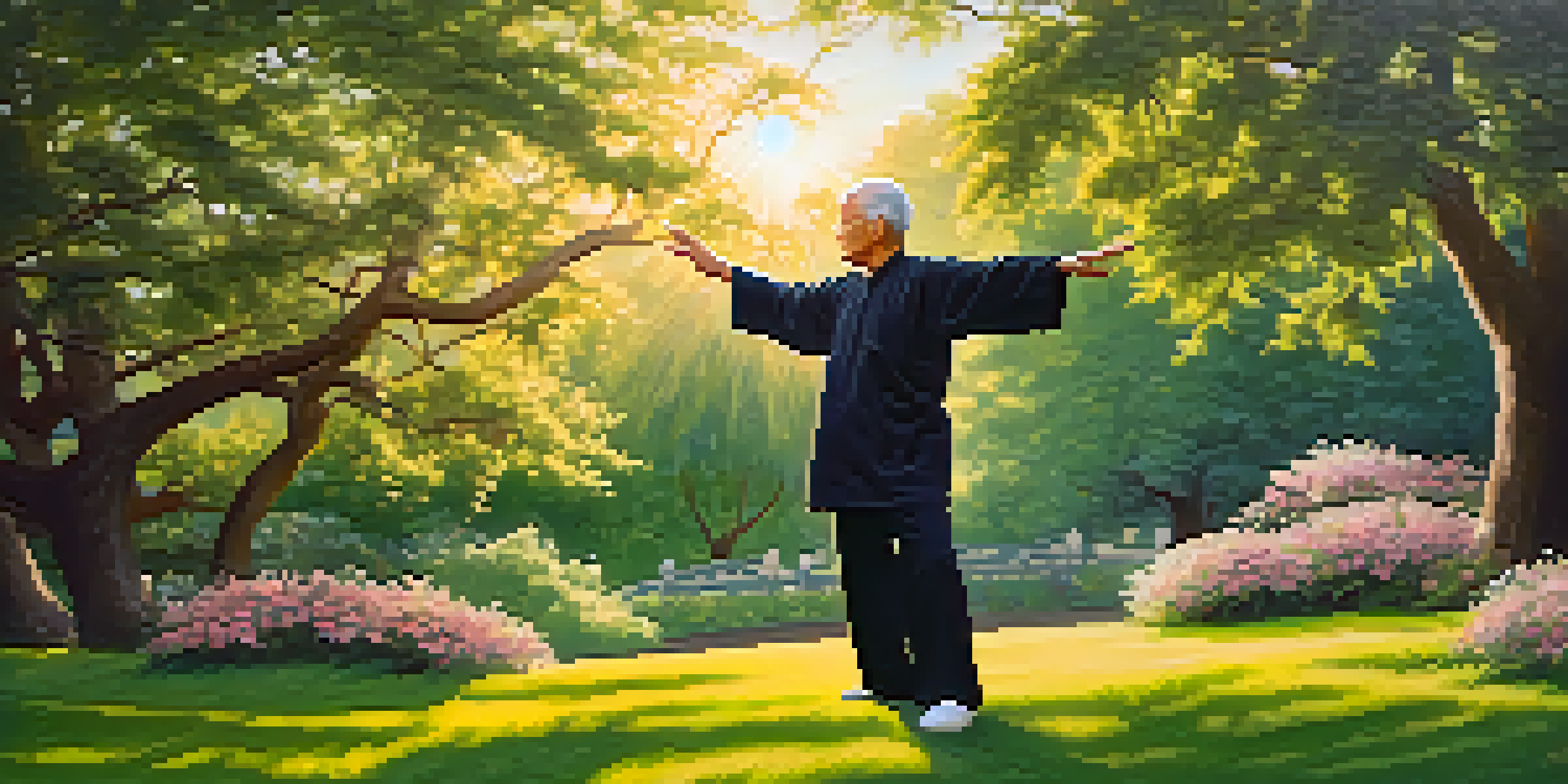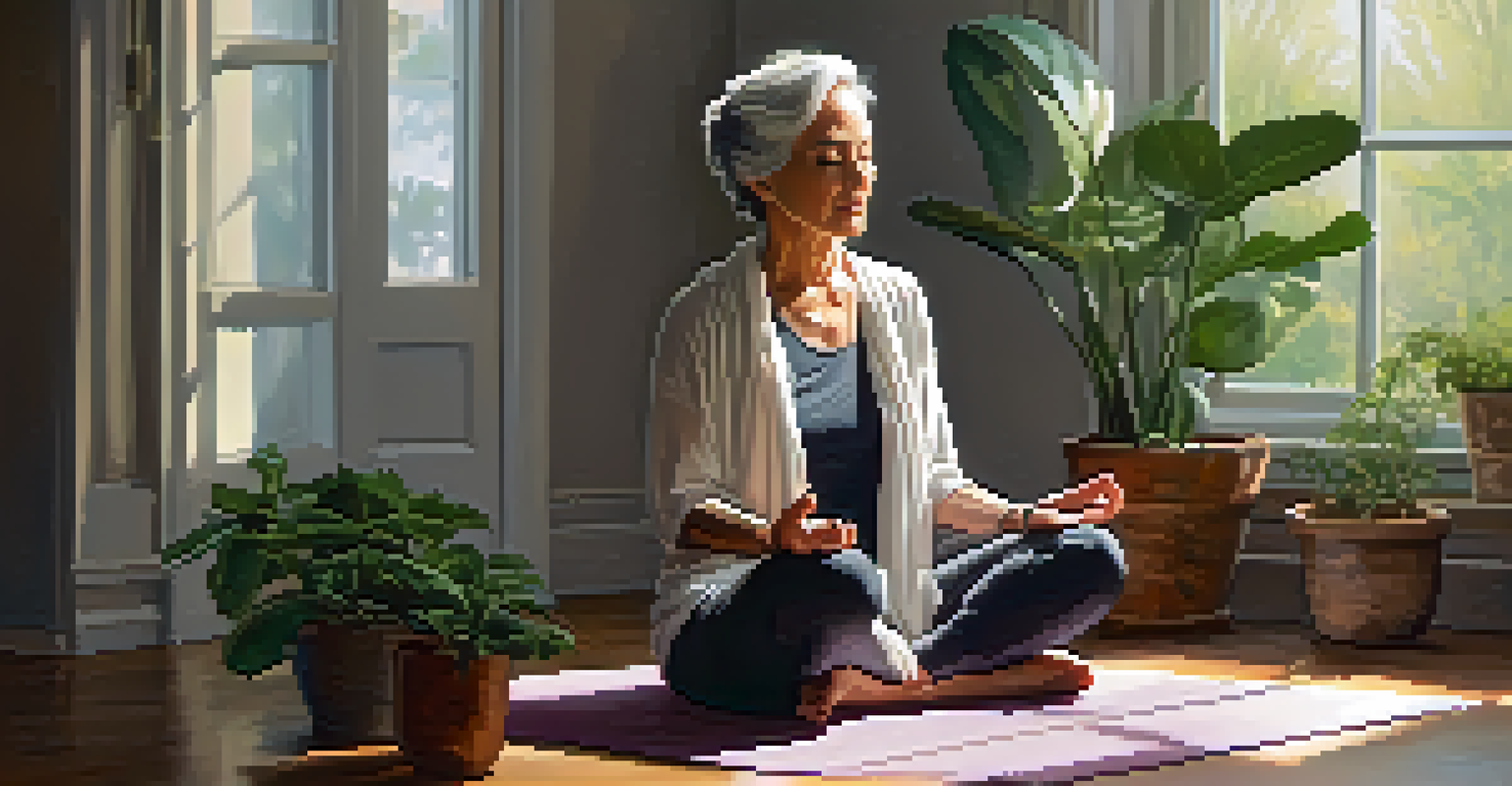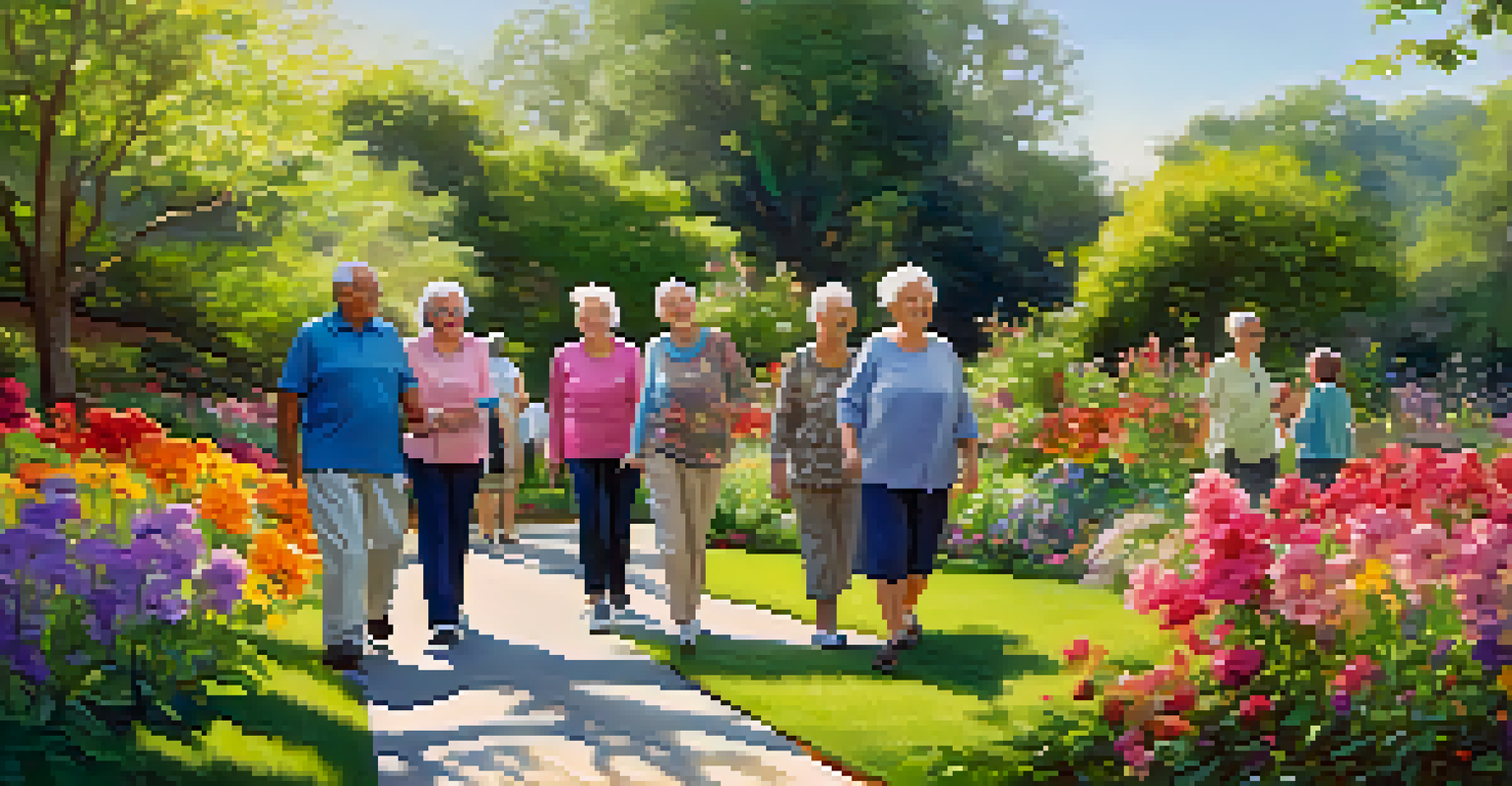Mind-Body Techniques for Wellness in Aging Individuals

Understanding Mind-Body Techniques and Their Benefits
Mind-body techniques refer to practices that focus on the connection between mental and physical health. These techniques include mindfulness, meditation, yoga, and tai chi, all of which promote relaxation and reduce stress. For aging individuals, these practices can enhance overall well-being by improving emotional resilience and physical health.
The mind is everything. What you think you become.
Research shows that engaging in mind-body practices can lower blood pressure, improve sleep quality, and even boost the immune system. By fostering a sense of calm and awareness, these techniques help individuals manage the challenges that often come with aging. It's like giving your mind a gentle workout while simultaneously nurturing your body.
For older adults, the beauty of mind-body practices lies in their accessibility. Whether it’s a few minutes of deep breathing or a gentle yoga session, these techniques can be tailored to fit individual needs and capabilities, making them suitable for everyone.
Mindfulness: Cultivating Awareness in Daily Life
Mindfulness involves being fully present and engaged in the moment, which can be especially beneficial for older adults. By focusing on the here and now, individuals can reduce anxiety about the past or future, leading to a more peaceful state of mind. It's like taking a mental vacation where worries fade away.

Practicing mindfulness can be as simple as paying attention to your breath or savoring a meal without distractions. This practice encourages individuals to notice their thoughts and feelings without judgment, fostering a greater sense of self-acceptance. Over time, this can significantly enhance emotional well-being and resilience.
Mind-Body Techniques Enhance Wellness
Practices like yoga and meditation promote relaxation and improve emotional and physical health for aging individuals.
Incorporating mindfulness into daily activities can be transformative. Whether it’s during a morning walk or while gardening, older adults can embrace the present moment, leading to a richer, more fulfilling life experience.
Meditation: A Pathway to Inner Peace
Meditation is a powerful mind-body technique that can help aging individuals achieve a state of relaxation and mental clarity. Through focused attention and deep breathing, meditation allows the mind to settle, reducing stress and promoting emotional balance. Think of it as a way to hit the 'reset' button on your brain.
The greatest weapon against stress is our ability to choose one thought over another.
There are various forms of meditation, from guided visuals to loving-kindness practices. Each type offers unique benefits, whether it's enhancing focus, promoting compassion, or simply providing a moment of tranquility amidst life's chaos. It's like finding the perfect playlist that resonates with your soul.
For older adults, meditation can be a valuable tool for managing chronic pain or anxiety. By dedicating just a few minutes each day to this practice, individuals can cultivate a sense of calm that ripples through all aspects of their lives.
Yoga: Strengthening the Body and Mind
Yoga is an ancient practice that combines physical postures, breathing exercises, and meditation, making it a fantastic mind-body technique for older adults. It promotes flexibility, balance, and strength, which are crucial for maintaining mobility as we age. Picture yoga as a gentle dance that celebrates your body's capabilities.
Beyond the physical benefits, yoga also enhances mental clarity and emotional stability. The mindfulness element of yoga encourages practitioners to connect with their bodies and emotions, creating a holistic approach to wellness. It’s like a beautiful conversation between your mind and body.
Mindfulness Reduces Anxiety
Focusing on the present moment helps older adults manage stress and cultivate a greater sense of self-acceptance.
Many yoga classes cater specifically to seniors, focusing on gentle movements that respect each individual's limitations. This inclusivity makes yoga an excellent choice for anyone looking to improve their health and well-being, regardless of experience.
Tai Chi: The Art of Moving Meditation
Tai Chi is often described as 'meditation in motion,' and for good reason. This gentle martial art involves slow, flowing movements that promote balance, flexibility, and relaxation. For older adults, practicing Tai Chi can feel like a serene dance, enhancing both physical and mental health.
The rhythmic movements of Tai Chi help improve coordination and reduce the risk of falls, making it particularly beneficial for seniors. Additionally, the focused breathing and mindfulness aspects of Tai Chi promote stress reduction and emotional well-being. It's like weaving a tapestry of health with each graceful movement.
Classes are widely available, and many are designed specifically for seniors, ensuring a safe and enjoyable experience. Embracing Tai Chi can open the door to a supportive community while fostering a deeper connection to one's body and mind.
Breathwork: Harnessing the Power of Breath
Breathwork is a simple yet powerful technique that focuses on controlling the breath to enhance physical and emotional health. For aging individuals, learning to breathe deeply can reduce anxiety and improve lung capacity, making it a valuable practice. Think of breathwork as a way to tune your body's instrument for optimal performance.
By practicing deep breathing exercises, seniors can activate their body's relaxation response, leading to lower stress levels and improved focus. This technique can be easily integrated into daily routines, whether it’s during a morning stretch or while sitting quietly with a cup of tea.
Gratitude Boosts Mental Health
Reflecting on positive aspects of life can enhance happiness and resilience among seniors.
Incorporating breathwork into daily life can lead to profound changes in how one feels and interacts with the world. It empowers individuals to take charge of their well-being, one breath at a time.
Gratitude Practices: Cultivating a Positive Mindset
Gratitude practices involve intentionally reflecting on the positive aspects of life, which can significantly impact mental health for aging individuals. By focusing on what they are thankful for, seniors can shift their mindset and diminish feelings of loneliness or depression. It’s like adding a splash of color to a black-and-white picture.
Keeping a gratitude journal or sharing daily highlights with loved ones are simple ways to incorporate gratitude into everyday life. These practices remind individuals of their strengths and the joys that surround them, fostering a sense of connection and purpose.

As older adults embrace gratitude, they often find that their overall outlook on life improves. This shift can lead to increased happiness and resilience, proving that even small changes can make a big difference.
Integrating Mind-Body Techniques into Daily Routines
Integrating mind-body techniques into daily life doesn’t have to be overwhelming. Start with small, manageable practices that resonate with you, whether it’s a few minutes of meditation or a short walk practicing mindfulness. Think of these techniques as sprinkles of wellness that can enhance your day.
Creating a routine can help solidify these practices. For instance, setting aside time each morning for gentle yoga or evening breathwork can establish a comforting ritual that promotes self-care. Over time, these small efforts can lead to significant improvements in overall well-being.
Remember, the goal is to find joy in these techniques rather than viewing them as chores. By embracing mind-body practices that feel right, aging individuals can cultivate a more vibrant and fulfilling life.